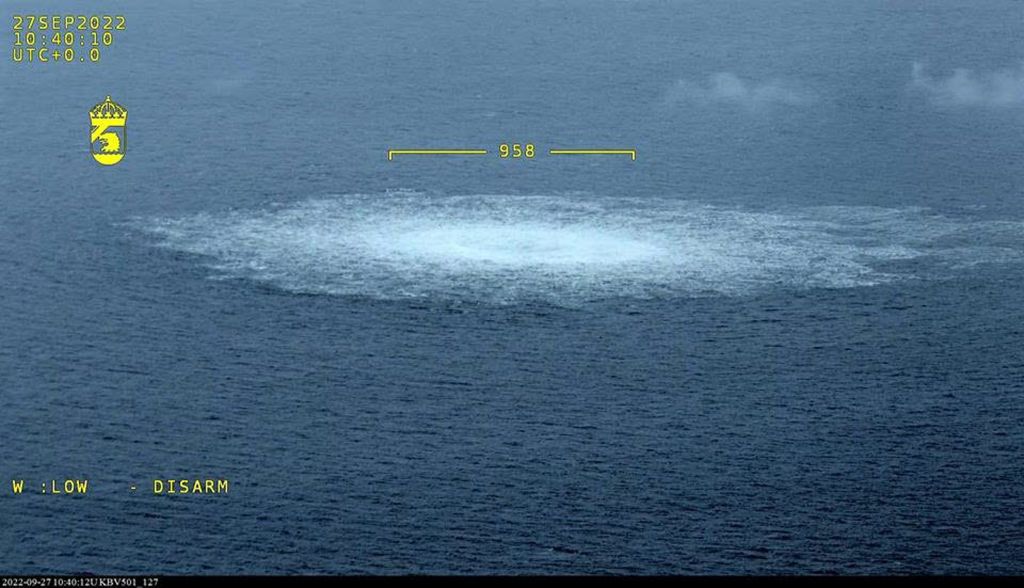With Nord Stream making headlines again, Donald Tusk tells its patrons to 'apologize and keep quiet'

Polish Prime Minister Donald Tusk has responded to a flurry of reports about who was responsible for blowing up the Nord Stream pipelines in 2022, by calling for the "initiators and patrons" of the project that benefitted Russia to "apologize and keep quiet."
Poland has come under particular scrutiny in recent days over the act of sabotage which is still being investigated by Germany, with a former head of Berlin’s foreign intelligence agency, BND, earlier this week claiming it could not have been carried out without Warsaw's support.
On Aug. 16, Krzysztof Gawkowski, a deputy Polish prime minister and the minister of digital affairs, denied the report, saying the comments were "inspired by Moscow" with the aim of destabilizing NATO.
In an apparent response to the ongoing drama, Tusk on Aug. 17 made a plea on social media.
"To all the initiators and patrons of Nord Stream 1 and 2. The only thing you should do today about it is apologize and keep quiet," he said.
To all the initiators and patrons of Nord Stream 1 and 2. The only thing you should do today about it is apologise and keep quiet.
— Donald Tusk (@donaldtusk) August 17, 2024
German authorities issued an arrest warrant for a Ukrainian national in connection to the explosions of the Nord Stream pipelines, according to a media investigation by several German news outlets published on Aug. 14.
The man, a diving instructor introduced simply as Volodymyr Z., was last seen in a Polish town west of Warsaw but has now gone into hiding, the investigation by ARD, Süddeutsche Zeitung (SZ), and Die Zeit said.
This would be the first arrest warrant issued in connection with the 2022 explosions at the gas pipelines connecting Germany with Russia via the Baltic Sea. Other outlets have supported the story, while the Federal Prosecutor's Office has declined to comment.
The Swedish outlet Expressen, which has cooperated with the German outlets, said the suspect's full name was Volodymyr Zhuravlov, aged 44. He is suspected of an anti-constitutional sabotage and of causing an explosion.
German journalists said they reached out to Volodymyr Z. on the phone, but the man denied involvement and quickly hung up.
The media investigation claimed that two other suspects – a man and a woman – are also Ukrainian citizens but uncovered no evidence of the Ukrainian government's involvement. Kyiv has repeatedly denied connection to the Nord Stream blasts.
The suspects are believed to have been sailing a boat, Andromeda, on the Baltic Sea in September 2022. German investigators reportedly believe that Volodymyr Z. was one of the passengers of a white Citroen van that was caught on camera near the German island of Rugen on Sept. 8, 2022, just a few weeks before the Nord Stream blasts on Sept. 26.
The vehicle is believed to have transported the suspects to Andromeda, which made a stop at Rugen.
German investigators have reportedly collected evidence to identify Volodymyr Z. over the period of several months, using photographs and witness statements.
The other two Ukrainians are also suspected of direct involvement, possibly by placing explosive charges on the pipelines while diving. The information on the suspects was based on foreign intelligence, among other evidence, the media investigation said.
No arrest warrant has been issued against the other suspects.
German prosecutors managed to have the European arrest warrant issued already in June and approached Polish authorities, hoping to have Volodymyr Z. arrested. For unknown reasons, Poland did not accommodate Germany's request, and the suspect is believed to have left the country, Spiegel wrote.
The Polish Prosecutor's Office confirmed that Germany filed the European arrest warrant but claimed that Volodymyr Z. was not listed in the wanted persons database used by the Polish Border Guard.
"At the beginning of July, the man crossed the Polish border with Ukraine," Anna Adamiak, the spokesperson of Poland's Prosecutor's Office, said in a comment for Onet. The suspect was not found at his residence when Polish authorities arrived, she added.
If confirmed, this would be the most significant breakthrough in the investigation that has already been dropped by Denmark and Sweden. The West and Ukraine have repeatedly traded accusations with Russia over the explosions.
Some German investigators have previously linked the explosions to Ukraine, accusing a crew of Ukrainians of carrying out the sabotage, but did not say whether it was officially authorized by Kyiv.
Sources with knowledge of the German investigation told the Wall Street Journal (WSJ) in January 2024 that they believe the attack was launched from Poland and said that the Polish government has been hesitant to provide information to investigators and withheld other evidence.
In January 2023, investigators said they had discovered traces of explosives on a boat they believed transported the charges used in the blast.
The construction of Nord Stream 2, which began in 2018, came under heavy criticism from the U.S., Ukraine, and other European countries. The new gas pipeline threatened to deepen the energy dependency of the EU's leading economy on Russia and effectively create a new leverage for Moscow.
While completed in 2021, the pipeline was never put into service. German Chancellor Olaf Scholz suspended its certification in February 2022, shortly before the start of the Russian full-scale invasion of Ukraine and a breakdown of relations between the EU and Russia.












